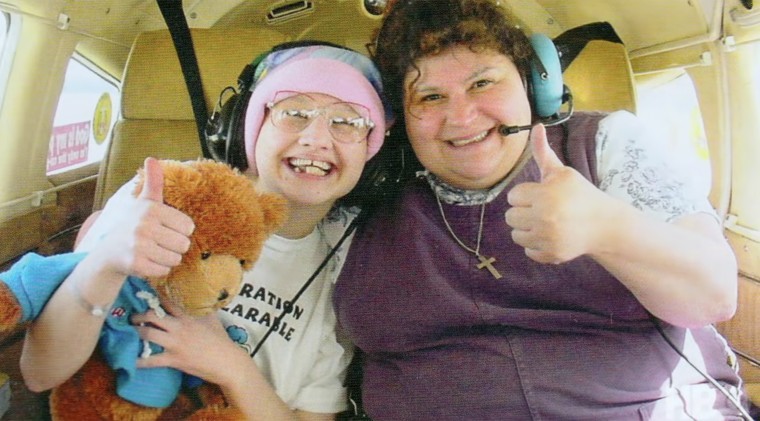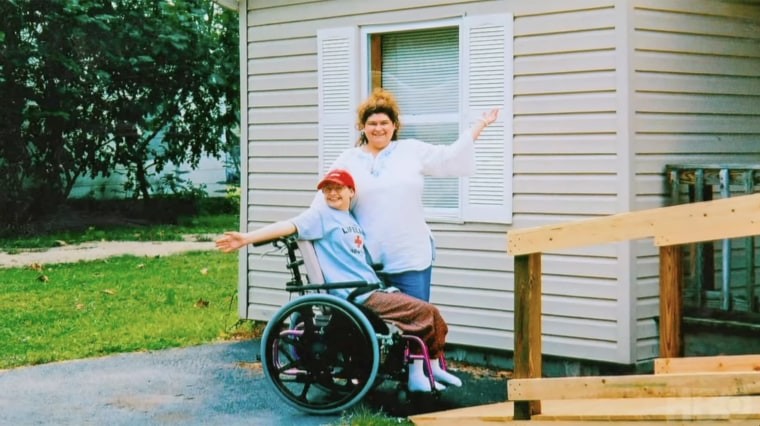Why Was Gypsy Rose In Jail? WHY.EDU.VN delves into the complex story of Gypsy Rose Blanchard, exploring the circumstances that led to her imprisonment and the underlying factors that shaped her tragic case. This comprehensive exploration sheds light on Munchausen syndrome by proxy, abuse, and the search for justice. Explore the details, implications, and insights surrounding this notorious case.
Table of Contents
- Understanding the Case: Why Was Gypsy Rose In Jail?
- Who is Gypsy Rose Blanchard?
- The Dark Reality: What Did Gypsy Rose Blanchard’s Mother Do to Her?
- Unveiling Suspicions: Didn’t Doctors Suspect that Dee Dee Blanchard Was Lying?
- The Verdict: Were Gypsy Rose Blanchard and Nicholas Godejohn Both Convicted of Murder?
- Freedom Delayed: When Was Gypsy Rose Blanchard Originally Going to Be Released From Prison?
- Life After Bars: What Has Gypsy Rose Blanchard Done Since Her Release From Prison?
- Media’s Take: Were There TV Specials About Her Case?
- FAQ: Unveiling More About Gypsy Rose Blanchard’s Case
- Seeking Clarity and Answers: How WHY.EDU.VN Can Help
1. Understanding the Case: Why Was Gypsy Rose In Jail?
Gypsy Rose Blanchard’s name became synonymous with a shocking crime that gripped the nation: the murder of her mother, Dee Dee Blanchard. But the question of why Gypsy Rose was in jail is far more complex than a simple crime story. It involves years of alleged abuse, a psychological disorder known as Munchausen syndrome by proxy, and a desperate act that had profound legal and ethical implications. Understanding the full context requires peeling back the layers of deception and manipulation that defined Gypsy’s life.
Gypsy Rose Blanchard was jailed because she played a role in the killing of her mother, Dee Dee Blanchard. In 2016, she was sentenced to 10 years in prison after pleading guilty to second-degree murder. This decision was made because of the very specific circumstances of her case, most notably the severe abuse Gypsy Rose allegedly endured at the hands of her mother. The case became a focal point in the examination of abuse dynamics, mental health, and the intricacies of justice.
The circumstances surrounding the case underscore the difficulties of identifying mistreatment and the long-term consequences for those who are subjected to it. For more information, keep reading this in-depth analysis, which attempts to address all the crucial aspects of this complex legal and human narrative.
2. Who is Gypsy Rose Blanchard?
Gypsy Rose Blanchard is a figure at the center of a controversial and tragic story. Born in 1991, she spent much of her life under the complete control of her mother, Dee Dee Blanchard. Dee Dee portrayed Gypsy as a chronically ill child suffering from conditions like leukemia, muscular dystrophy, and other serious ailments. This led to an outpouring of support from their community, including donations, trips, and even a house built specifically for their needs.
However, the truth was far more sinister. As Gypsy grew older, she began to realize that she wasn’t actually sick. Dee Dee, it is believed, had Munchausen syndrome by proxy, a psychological disorder where a caregiver exaggerates or induces illness in someone under their care to gain attention and sympathy. This meant Gypsy was subjected to unnecessary medical treatments, medications, and surgeries. She was also confined to a wheelchair and feeding tube, despite being able to walk and eat normally.
In an attempt to escape this abusive situation, Gypsy conspired with her then-boyfriend, Nicholas Godejohn, to kill Dee Dee. In 2015, Godejohn traveled to their home and stabbed Dee Dee to death while Gypsy hid. Both were arrested, and Gypsy eventually pleaded guilty to second-degree murder, receiving a 10-year prison sentence. After serving seven years, she was released on parole in December 2023, sparking renewed interest in her case and raising questions about justice, abuse, and mental health.
Key Aspects of Gypsy Rose Blanchard’s Life
| Aspect | Description |
|---|---|
| Early Life | Subjected to medical abuse by her mother, Dee Dee Blanchard, who falsely claimed Gypsy had various illnesses. |
| Abuse | Forced to undergo unnecessary medical treatments, use a wheelchair and feeding tube, and take medications she didn’t need. Dee Dee also controlled Gypsy’s access to education, socialization, and personal freedom. |
| Crime | Conspired with Nicholas Godejohn to murder her mother in 2015. |
| Legal Outcome | Pleaded guilty to second-degree murder and was sentenced to 10 years in prison. |
| Release | Released on parole in December 2023 after serving seven years. |
| Post-Release Life | Focused on advocacy, mental health awareness, and sharing her story through various media platforms. |



3. The Dark Reality: What Did Gypsy Rose Blanchard’s Mother Do to Her?
Dee Dee Blanchard’s actions towards Gypsy Rose were a horrifying example of Munchausen syndrome by proxy. She systematically subjected Gypsy to medical abuse, convincing doctors and the community that her daughter suffered from a host of severe illnesses.
Dee Dee’s actions included:
- Falsifying Medical Records: She fabricated Gypsy’s medical history, claiming she had leukemia, muscular dystrophy, epilepsy, and other conditions.
- Unnecessary Medical Procedures: Gypsy underwent numerous tests, surgeries, and treatments that she didn’t need, including the removal of her salivary glands and the insertion of a feeding tube.
- Medication Abuse: Dee Dee administered various medications to Gypsy, some of which had harmful side effects.
- Physical Control: She shaved Gypsy’s head to reinforce the image of a cancer patient and forced her to use a wheelchair, despite being able to walk.
- Isolation: Dee Dee isolated Gypsy from her family and peers, controlling her access to education and social interaction.
- Financial Exploitation: She used Gypsy’s false illnesses to solicit donations and gifts from charitable organizations and the community.
Dee Dee’s abuse had a devastating impact on Gypsy’s physical and emotional well-being, robbing her of her childhood and basic human rights.
4. Unveiling Suspicions: Didn’t Doctors Suspect that Dee Dee Blanchard Was Lying?
Despite Dee Dee’s elaborate deception, some doctors did raise concerns about Gypsy’s supposed illnesses.
- Dr. Bernardo Flasterstein: This neurologist noticed discrepancies in Gypsy’s medical records and found no evidence of muscular dystrophy in her tests. He contacted doctors in Louisiana and discovered that Gypsy’s original muscle biopsy was negative.
- Other Medical Professionals: Some doctors questioned the need for certain treatments and expressed doubts about Dee Dee’s claims. However, Dee Dee often switched doctors or moved to new locations to avoid scrutiny.
The suspicions of these medical professionals highlight the challenges of detecting Munchausen syndrome by proxy. Dee Dee was skilled at manipulating the medical system and exploiting the trust that doctors place in parents. The failure to fully investigate these concerns allowed the abuse to continue for years.
5. The Verdict: Were Gypsy Rose Blanchard and Nicholas Godejohn Both Convicted of Murder?
Yes, both Gypsy Rose Blanchard and Nicholas Godejohn were convicted in connection to Dee Dee Blanchard’s murder. However, they faced different charges and received different sentences.
- Gypsy Rose Blanchard: She pleaded guilty to second-degree murder and was sentenced to 10 years in prison. The prosecution took into account the years of abuse she suffered at the hands of her mother, which influenced the plea deal.
- Nicholas Godejohn: He was found guilty of first-degree murder and sentenced to life in prison. Godejohn carried out the actual stabbing of Dee Dee Blanchard.
The differing charges and sentences reflect the different roles each played in the crime. Gypsy was seen as a victim of abuse who sought a way out of her situation, while Godejohn was the one who committed the act of violence.
Legal Outcomes for Gypsy Rose and Nicholas Godejohn
| Individual | Charge | Sentence |
|---|---|---|
| Gypsy Rose Blanchard | Second-Degree Murder | 10 Years in Prison |
| Nicholas Godejohn | First-Degree Murder | Life in Prison |
6. Freedom Delayed: When Was Gypsy Rose Blanchard Originally Going to Be Released From Prison?
Gypsy Rose Blanchard was originally scheduled to be released from prison in 2026, after serving the entirety of her 10-year sentence. However, due to good behavior and other factors, she was granted parole and released on December 28, 2023, three years ahead of her original release date.
Her early release sparked a mixture of reactions, with some people expressing sympathy and support, while others questioned whether she deserved to be freed early given her role in her mother’s death. Regardless, her release marked the beginning of a new chapter in her life, one where she would have the opportunity to share her story, advocate for victims of abuse, and rebuild her life.
7. Life After Bars: What Has Gypsy Rose Blanchard Done Since Her Release From Prison?
Since her release from prison, Gypsy Rose Blanchard has been actively engaged in several activities, including:
- Advocacy: She has expressed a desire to raise awareness about Munchausen syndrome by proxy and advocate for victims of abuse.
- Social Media: Blanchard has been active on social media, sharing her experiences and connecting with supporters.
- Media Appearances: She has participated in interviews and documentaries, providing insights into her life and the events that led to her imprisonment.
- Book Publication: Gypsy Rose has written a book titled “Released: Conversations on the Eve of Freedom,” which was published in January and details her experiences and reflections.
Her post-release activities suggest a commitment to using her platform to educate others, promote awareness, and contribute to the conversation surrounding abuse and mental health.
8. Media’s Take: Were There TV Specials About Her Case?
The case of Gypsy Rose Blanchard has garnered significant media attention, resulting in several TV specials, documentaries, and dramatizations. These include:
- Mommy Dead and Dearest (2017): An HBO documentary that delves into the complex relationship between Gypsy and Dee Dee Blanchard.
- Gypsy’s Revenge (2018): An Investigation Discovery special that explores the events leading up to Dee Dee’s murder.
- The Act (2019): A Hulu series inspired by the case, starring Joey King as Gypsy Rose Blanchard and Patricia Arquette as Dee Dee Blanchard.
- Love You To Death (2019): A Lifetime movie dramatizing the case.
- The Prison Confessions of Gypsy Rose Blanchard (2024): A Lifetime docuseries featuring interviews with Gypsy Rose Blanchard while she was in prison.
- Gypsy Rose: Life After Lock Up (2024): A Lifetime series documenting Gypsy Rose Blanchard’s life after her release from prison.
These media portrayals have contributed to the public’s fascination with the case, raising questions about the ethics of true crime entertainment and the impact on the individuals involved.
Media Adaptations of the Gypsy Rose Blanchard Case
| Title | Type | Year | Platform |
|---|---|---|---|
| Mommy Dead and Dearest | Documentary | 2017 | HBO |
| Gypsy’s Revenge | Documentary | 2018 | Investigation Discovery |
| The Act | TV Series | 2019 | Hulu |
| Love You To Death | Movie | 2019 | Lifetime |
| The Prison Confessions of Gypsy Rose Blanchard | Docuseries | 2024 | Lifetime |
| Gypsy Rose: Life After Lock Up | Docuseries | 2024 | Lifetime |
9. FAQ: Unveiling More About Gypsy Rose Blanchard’s Case
To further clarify the complexities of the Gypsy Rose Blanchard case, here are some frequently asked questions:
1. What is Munchausen syndrome by proxy?
Munchausen syndrome by proxy (MSBP), also known as factitious disorder imposed on another (FDIA), is a mental disorder in which a caregiver exaggerates or induces illness in someone under their care to gain attention and sympathy.
2. How did Dee Dee Blanchard deceive doctors?
Dee Dee fabricated Gypsy’s medical history, falsified records, and switched doctors frequently to avoid scrutiny. She also manipulated Gypsy into playing along with her lies.
3. Why did Gypsy Rose Blanchard plead guilty to second-degree murder?
The prosecution took into account the years of abuse she suffered, which influenced the plea deal. Second-degree murder implies that the killing was not premeditated.
4. What has Nicholas Godejohn said about the murder?
Nicholas Godejohn has stated that he committed the murder out of love for Gypsy and to help her escape her abusive situation.
5. How has Gypsy Rose Blanchard used her platform since her release?
She has been advocating for awareness about Munchausen syndrome by proxy, sharing her story, and promoting mental health awareness.
6. What are some of the ethical considerations surrounding the media coverage of the case?
Some critics argue that the media has sensationalized the case and exploited the trauma of the individuals involved. Others argue that the coverage has helped raise awareness about Munchausen syndrome by proxy and abuse.
7. How can I support victims of Munchausen syndrome by proxy?
You can support victims by educating yourself about the disorder, donating to organizations that support victims of abuse, and advocating for policies that protect vulnerable individuals.
8. Where can I find reliable information about Munchausen syndrome by proxy?
You can find reliable information from medical and psychological organizations, such as the Mayo Clinic, the American Psychiatric Association, and the National Center for Missing and Exploited Children.
9. What resources are available for victims of abuse?
Resources include the National Domestic Violence Hotline, the Childhelp USA National Child Abuse Hotline, and local domestic violence shelters and counseling services.
10. How has Gypsy Rose Blanchard’s case changed perceptions of abuse?
Gypsy Rose Blanchard’s case has shed light on the complexities of abuse and the long-term effects on victims. It has also sparked discussions about the legal and ethical considerations surrounding cases of abuse and self-defense.
10. Seeking Clarity and Answers: How WHY.EDU.VN Can Help
Navigating the complexities surrounding cases like Gypsy Rose Blanchard’s requires reliable information and expert insights. At WHY.EDU.VN, we are dedicated to providing clear, comprehensive, and trustworthy answers to your most pressing questions. Whether you’re seeking to understand the nuances of Munchausen syndrome by proxy, the legal implications of abuse, or the psychological impact of trauma, our platform offers a wealth of resources to guide you.
We understand the challenges in finding accurate and dependable information online. That’s why WHY.EDU.VN is committed to delivering content that is thoroughly researched, expertly written, and meticulously reviewed. Our team of professionals works diligently to ensure that you receive the most up-to-date and credible information available.
If you have further questions or need more in-depth explanations, we encourage you to reach out to us. Our experts are available to provide personalized answers and support. Contact us at 101 Curiosity Lane, Answer Town, CA 90210, United States, or via WhatsApp at +1 (213) 555-0101.
Visit our website at WHY.EDU.VN to explore a wide range of topics and discover the answers you’ve been searching for. Let why.edu.vn be your trusted source for knowledge and understanding.

